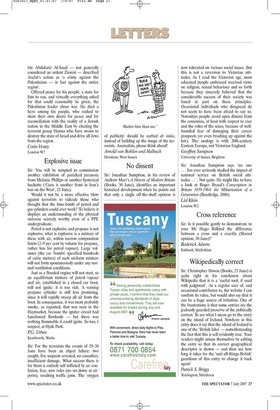No dissent
Sir: Jonathan Sumption, in his review of Andrew Marr's A History of Modem Britain (Books, 30 June), identifies an important historical development when he points out that only a single off-the-shelf opinion is now tolerated on various social issues. But this is not a reversion to Victorian attitudes. As I read the Victorian age, most educated people embraced received views on religion, sexual behaviour and so forth because they sincerely believed that the considerable success of their society was based in part on these principles. Occasional individuals who disagreed do not seem to have been afraid to say so. Nowadays people avoid open dissent from the consensus, at least with respect to race and the roles of the sexes, because of wellfounded fear of damaging their career prospects (or even brushing up against the law). The analogy is with 20th-century Eastern Europe, not Victorian England.
Geoffrey Sampson University of Sussex, Brighton Sir: Jonathan Sumption says 'no one . . . has ever seriously studied the impact of national service on British social attitudes. . . '. Not quite. He might like to have a look at Roger Broad's Conscription in Britain 1939-1964: the Militarisation of a Generation (Routledge, 2006).
Lisl Klein London W2



















































 Previous page
Previous page